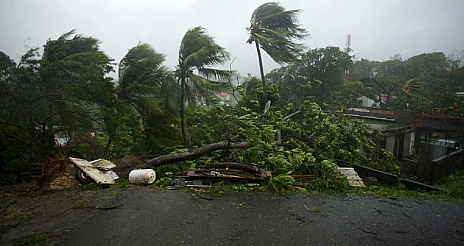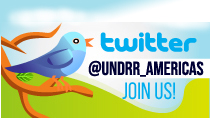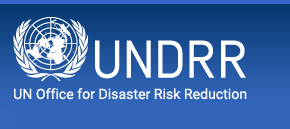- Our Mandate
- Mission and Objectives
- UNDRR in the UN
- Work Programme & Annual Reports
- Results Based System
- Work Partnerships
- Headquarters - Geneva
- SG-UN representatives for DRR
- Regional Office – The Americas and the Caribbean
- Head of the Regional Office – The Americas and the Caribbean
- What is Disaster Risk Reduction?
- What is the International Strategy?
- History of UNDRR
Was the private sector prepared for the devastating 2017 hurricane season in the Caribbean?

By: UNDRR – The Americas and the Caribbean
PANAMÁ CITY, PANAMÁ, SEPTEMBER 2018- The 2017 hurricane season was infamous for ravaging the Caribbean- twice. Though considered small in scope, these island nations have active economies and possess private sector entities involved in risk management. These circumstances compelled the question: Was the private sector prepared for the devastating 2017 hurricane season in the Caribbean? This was what the United Nations Office for Disaster Risk Reduction (UNDRR) considered when conducting the "Private Sector Study Preparedness for Enhanced Resilience after Hurricanes Irma and Maria in Dominica and the British Virgin Islands". This study provides a space for capturing the experiences of the private sector in disaster risk management (DRM) through actions and ongoing initiatives to enhance resiliencethroughout the Caribbean.
The study considers two of the most affected territories in the Caribbean after the Atlantic hurricane season 2017, especially by hurricanes Irma and Maria: Dominica and the British Virgin Islands (BVI); countries that had economic losses estimated at 110% and 148% respectively of the gross domestic product (GPD). The Global Assessment Report 2015 (GAR) mentions that losses in developing countries are up to five times higher than in high-income countries. The countries with the greatest need to invest in development are those most challenged by disaster risk. Comparably, Priority 4 of the Sendai Framework discusses how achieving greater disaster preparedness reduces overall loss, and effectively enhances recovery and reconstruction after a disaster.
The study reached out 131 entities including business owners and officials from private sector umbrella organizations such as the Dominica Association for Industry and Commerce, the British Virgin Island Chamber of Commerce and Hotel and Tourism Organizations, as well as government and disaster management officials. They were approached through multiple methods like key informant interviews, document reviews and surveys to identify and surface potential private sector good practices in DRM and recovery after the hurricanes impact.
Hurricanes Irma and Maria were infamous in their devastation to the region, but this study aimed to reiterate the private sector's damage following suit the islands' misfortune. These results recognize that the plan development process surrounding disasters is not systematized, and that may very well be the first step towards constructing effective response. Though results show that 67% of businesses surveyed had continuity plans in place before the hurricanes, it was clear after their impacts that the entities were highly unprepared for a level 5 hurricane. Recognizing the inconsistencies of information, resource access, education, and capacity building are required for organizing the lessons learned from Irma and Maria. Opportunities exist to explore exactly how business relationships with high-level institutions can address the mentioned gaps.
This study presents several recommendations based on the results shown, such as: increasing engagement for enhanced recovery. This includes supporting the partnership between UNDRR Private Sector Alliance for Disaster Resilient Societies –ARISE, and Enhancing Knowledge and Application of Comprehensive Disaster Management (EKACDM). This partnership seeks to teach business continuity planning in higher education as a fundamental element of business. This study also asserts the need for collaboration between disaster management organizations and the private sector on discussing their functions and capacities in furthering their respective reaches in disaster preparation. Current continuity efforts focus on the preparation for response and restoration after a disaster. A recommendation would be shifting this approach towards an all-encompassing, adaptive role towards preparation and resilience before a disaster.
It is important to highlight that after the devastating effects of Irma and Maria in the Caribbean, the private sector in both countries are further strengthening their resilience, preparedness and disaster risk reduction plans as shown in the study. This study is an opportunity to explore how partnerships between business communities, different sectors, and institutions can address these needs.
To read the complete document click here: https://bit.ly/2NbwAf6
The study is part of UNDRR Private Sector Alliance for Disaster Resilient Societies (ARISE) initiative that
seeks to raise awareness and increase understanding of collaborative opportunities for the public and private sector. It focuses on disaster risk reduction and how businesses can become more resilient by incorporating DRR practices. Its overall goal is to create risk-resilient societies by energizing the private sector in collaboration with the public sector and other stakeholders to deliver on the targets of the Sendai Framework.
This study conducted by UNDRR andwas possible thanks to the financial support of the United Parcel Service (UPS).
Related links
https://www.unisdr.org/partners/private-sector
http://www.cdema.org/
https://www.ups.com/us/en/Home.page
Follow the UNDRR news online :
 Now we have twitter account @UNDRR Américas y el Caribe
Now we have twitter account @UNDRR Américas y el Caribe
JOIN US!
Tweets por el @UNDRR Américas y el Caribe
